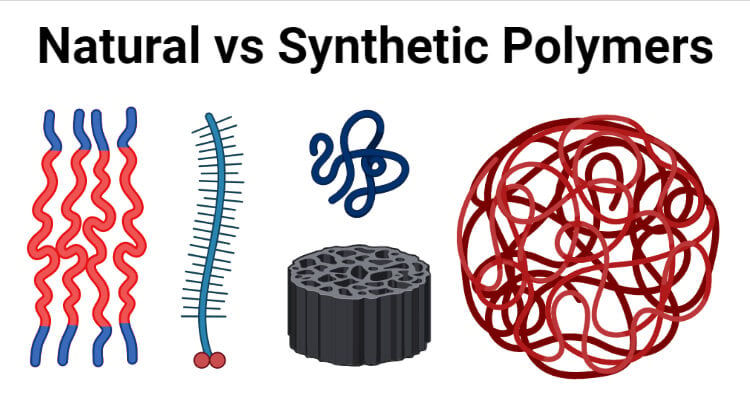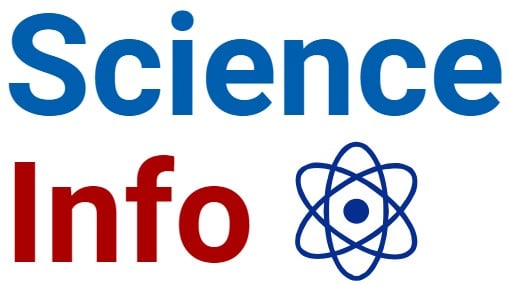Interesting Science Videos
Natural Polymers Definition
Natural polymers are natural substances composed of large macromolecules formed by the binding of small molecules called monomers.
- Natural polymers occur in the form of chemical compounds in biological systems and can be broadly categorized into three groups; polysaccharides, polyamides, and polynucleotides.
- Polymers are not restricted to monomers of the same chemical composition and might be made up of two or more monomeric units.
- Natural polymers, also known as organic polymers, are essential for the basic structure as well as vital life processes in living organisms.
- The size and length of natural polymers depend on the number of monomeric units linked together.
- These polymers are produced via biological processes like protein synthesis and nucleic acid synthesis. These polymers are formed via processes like addition polymerization or condensation polymerization.
- Natural polymers are eco-friendly as they can degrade naturally via biological processes in the environment.
- Some examples of natural polymers are proteins, nucleic acids, polysaccharides, etc.

Synthetic Polymers Definition
Synthetic polymers are substances that are produced artificially in laboratories and industries with the help of chemical reactions.
- Synthetic polymers are produced via chemical reactions artificially to produce a desirable product of industrial importance.
- Depending on the type of method of production and the nature of raw materials, synthetic polymers can be categorized into different groups and can be used for different purposes.
- The production of the synthetic polymer was initially inspired by natural polymers and their applications.
- Most synthetic polymers are produced from petroleum oil and are composed of hydrocarbons. However, inorganic synthetic polymers can be produced by other chemical substances.
- Inorganic synthetic polymers are incredibly harmful to the environment as they take years to degrade and might remain on the planet as pollutants.
- Since synthetic polymers can be modified in laboratories under controlled conditions, these are easier to handle.
- Some examples of synthetic polymers are polystyrene, nylon, silicone, polyvinyl chloride, etc.
7 Major Differences (Natural Polymers vs Synthetic Polymers)
| Characteristics | Natural Polymers | Synthetic Polymers |
| Definition | Natural polymers are natural substances composed of large macromolecules formed by the binding of small molecules called monomers. | Synthetic polymers are substances that are produced artificially in laboratories and industries with the help of chemical reactions. |
| Occurrence | Natural polymers occur naturally. | Synthetic polymers do not occur naturally and are produced via chemical reactions. |
| Processes | Natural polymers are produced from biological processes. | Synthetic polymers are produced via chemical processes. |
| Degradation | Natural polymers degrade easily by biological processes. | Synthetic polymers are rigid and do not degrade naturally by biological processes. |
| Handling | Natural polymers cannot easily be controlled as per need. | Synthetic polymers can be modified in laboratories under controlled conditions. |
| Environmental impact | Natural polymers are environmentally friendly as these can be degraded via natural means. | Synthetic polymers are not environmentally friendly as they require long periods of time for degradation. |
| Examples | Some examples of natural polymers are proteins, nucleic acids, polysaccharides, etc. | Some examples of synthetic polymers are polystyrene, nylon, silicone, etc. |
Example of Natural Polymers
Protein
- Proteins are natural polymers formed by the polymerization of monomeric units, amino acids.
- The amino acids are arranged in a particular order which is determined by the sequences in the RNA, which, in turn, depends on the sequence of the DNA segment.
- Proteins are produced in all living organisms by the process of translation that are then modified in the ribosomes.
- The monomeric units of proteins are amino acids which are organic molecules composed of hydrogen, oxygen, carbon, and other elements.
- Amino acids in proteins are linked together by peptide bonds between the amino group of one amino acid and the carboxylic group of the other.
- Proteins can be broken down into individual molecules of amino acids in the presence of enzymes. The process of polymerization might also require certain enzymes.
Example of Synthetic Polymers
Polyvinyl chloride (PVC)
- Polyvinyl chloride (PVC) is the world’s third most widely produced synthetic plastic polymer used for different purposes throughout different industries.
- Polyvinyl chloride is a polymer of vinyl chloride where most of the production involves suspension polymerization. The rest involves emulsion polymerization and bulk polymerization.
- The polymer is linear and strong where the monomers are arranged head-to-tail with chlorides on alternating carbon centers.
- Besides polymerization, the process also requires additives like heat stabilizers and plasticizers, which are essential to produce a finished product.
- Polyvinyl chloride is a thermoplastic polymer that can be found in two distinct forms; rigid PVC and flexible PVC.
- PVC is mainly used as pipes for municipal and industrial applications. It is also used in electrical wires due to its flexibility.
References and Sources
- Bhatia S. (2016) Natural Polymers vs Synthetic Polymer. In: Natural Polymer Drug Delivery Systems. Springer, Cham. https://doi.org/10.1007/978-3-319-41129-3_3
- https://pediaa.com/difference-between-natural-and-synthetic-polymers/ – 19%
- https://en.wikipedia.org/wiki/Poly_(vinyl_chloride) – 8%
- https://www.britannica.com/science/polymer – 6%
- https://quizlet.com/70911019/amino-acids-flash-cards/ – 2%
- https://invece-kies.biz/en/polyvinyl-chloride/rwu3f3151-dq0d – 2%
- https://coredifferences.com/difference-between-natural-and-synthetic-polymers/ – 1%
- https://www.toppr.com/ask/question/the-sequence-in-which-amino-acids-are-arrangedin-a-protein-is-called/ – 1%

Thanks a lot, really useful
I didnt chose my profile pic 😉